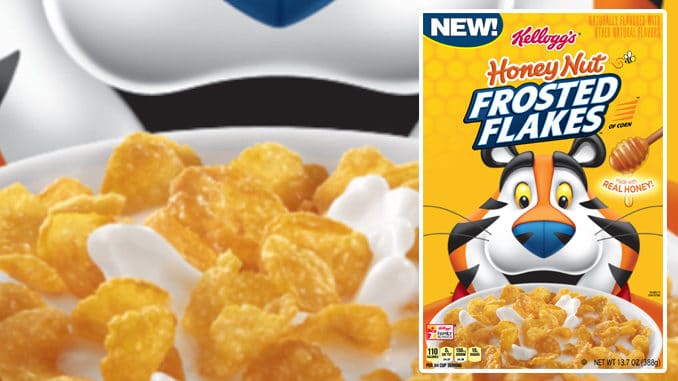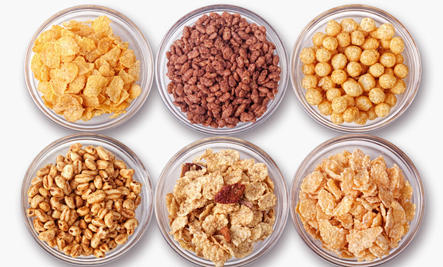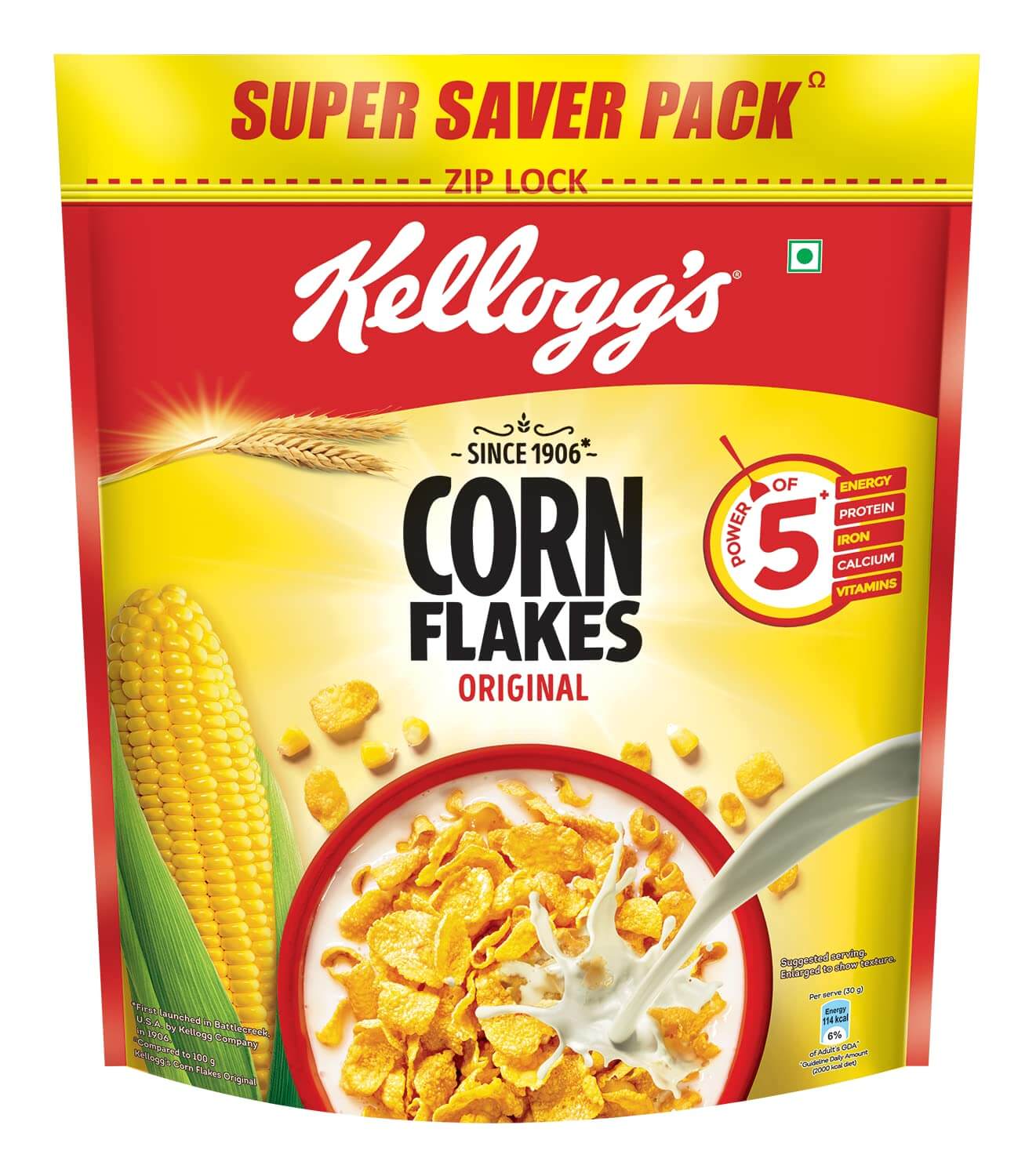One of the most popular cereals in America is undoubtedly corn flakes.
Introduced in 1894, corn flakes are still a breakfast stable in American homes.
In fact, Statista estimated that 23.44 million Americans had at least a portion of Kellogg’s corn flakes in a span of one week in 2020 alone.
And it is not just Americans who love corn flakes—the cereal is also a staple in many countries across the globe including Latin America, Europe, and Japan.
If you are one of those people who can’t start their mornings without a bowl of corn flakes, you might have even shared or thought of sharing this delicious cereal with your pup.
But can dogs eat corn flakes? Is this breakfast cereal safe for your four-legged friend?
Succinct Answer (aka Summary)
Technically, sharing small amounts of cornflakes with your dog may not have immediate harmful effects due to its non-toxic nature and low-fat content.
But it can be detrimental to their long-term health in the long run.
Regular feeding or allowing them to consume large quantities at once can lead to issues such as weight gain, diabetes, poor oral health, and behavioral problems.
Cornflakes also contain significant amounts of sugar, along with excess calories and high sodium levels.
Furthermore, the potential carcinogen BHT found in cornflakes makes it not worth the risk to feed them to your dog.
Long Answer

While not necessarily harmful in small doses, there are several reasons why allowing your dog to eat corn flakes regularly can compromise his health.
First things first, let’s try and understand the composition of this breakfast cereal.
The main ingredients in corn flakes include:
- Milled Corn
- Salt
- Sugar (Contains 2% or Less of Malt Flavor)
- Vitamins and Minerals: Iron, Thiamin Hydrochloride (Vitamin B1), Vitamin B2 (Riboflavin), Ascorbic Acid (Vitamin C), Niacinamide, Pyridoxine Hydrochloride (Vitamin B6), Folic Acid, Vitamin A Palmitate & Vitamin D.
- BHT for Freshness
From this list, it is apparent that corn flakes has a lot of controversial ingredients that can be detrimental to your dog’s health, including:
Corn
Generally, corn is safe for dogs, especially when fed in moderation.
It is a potent source of carbohydrates, protein, fiber, vitamins, and linoleic acids.
However, milled or processed corn may contain high amounts of sodium and fats, which are often included for value-addition purposes.
So, by feeding your dog corn flakes on a regular basis, you may be exposing him to obesity and other serious health issues like kidney diseases.
Some dogs are also allergic to corn, so before giving your pup corn flakes, you might want to check if he is allergic to it first.
Consider feeding your dog a few pieces of corn flakes and if you notice any abnormal symptoms, stop feeding him these cereals and any other food that contains corn.
High Sugar Content
Another big issue with corn flakes for dogs is the high sugar content.
A 1 1/2 Cup (42 g) serving of corn flakes has 4 grams of added sugar, so you can imagine the amount of sugar you expose your dog to if you feed him a whole packet of this cereal.
There are many reasons why foods with high sugar content are not recommended for dogs.
To begin with, like humans, sugar is bad for your pup’s oral health.
While dogs can handle well occasional sugary treats, excess sugar can cause enamel wear and tooth decay in dogs.
So, it is important to avoid giving your dog corn flakes if you don’t regularly brush your pup’s teeth.
The risk to dental health is not the only reason why we don’t recommend corn flakes for your dog.
Sugar is also linked to a wide range of health issues in dogs, including weight gain, diabetes, and even behavioral issues.
Like in humans, sugary snacks can also cause blood glucose spikes, which can make your dog feel irritable and lethargic.
Too Many Calories
Besides high sugar content, corn flakes contain quite a lot of calories.
A 1 1/2 Cup (42 g) serving of corn flakes contains 150 calories.
Most dogs need around 25-30 calories per pound to maintain a healthy weight.
If you have a big and active dog, getting 150 calories from a single serving of corn flakes isn’t that bad, but it is another story for a small dog breed.
Feeding a few corn flakes to your small dog or a toy breed would make a good percentage of his recommended daily calorie intake, but won’t provide much nourishment.
Your dog needs a good balance of carbohydrates, proteins, and fat. Given that corn flakes are made for humans—and not dogs—it fails to provide all that.
BHT
BHT is another controversial ingredient in corn flakes that you don’t want to expose your canine friend to.
BHT (and its cousin, BHA) are both considered to be carcinogenic.
In a past study on rats, BHT was found to cause detrimental liver and kidney damage.
Although this study and many others that have been done on BHT are controversial, many pet advocacy groups suggest avoiding foods containing these preservatives until science can determine how exactly they affect your dog’s body.
Salt
The salt level that’s considered to be appropriate for humans is not always safe for your dog because salt tolerance in dogs is lower than that of humans.
Excess salt consumption in dogs can cause blood pressure, hypernatremia, electrolyte imbalance, and even sodium poisoning.
You risk exposing your dog to all these issues if you allow him to eat corn flakes regularly.
Can Dogs Eat Frosted Flakes?

First things first, here is a quick overview of the nutritional profiles of Corn Flakes vs Frosted Flakes:
| Kellogg Frosted Flakes | Kellogg Corn Flakes | |
| Serving Size | 1 Cup (37 g) Cereal without milk | 1 1/2 Cup (42 g) Cereal without milk |
| Calories | 130 | 150 |
| Sodium | 190mg | 300 mg |
| Total Carbohydrate | 33 g | 36 g |
| Dietary Fiber | 1 g | 1 g |
| Total Sugars | 12 g (12 g are added sugars) | 4 g (4 g are added sugars) |
| Protein | 2 g | 3 g |
| Vitamin D | 2 mcg 10% | 3 mcg 15% |
| Calcium | 0 mg 0% | 0 mg 0% |
| Iron | 7.2 mg 40% | 12 mg 60% |
| Potassium | 30mg 0% | 60 mg 0% |
| Thiamin | 20% | 30% |
| Riboflavin | 20% | 30% |
| Niacin | 20% | 30% |
| Vitamin B6 | 20% | 30% |
| Folate | 120 mcg 30% | 200 mcg 50% |
| Vitamin B12 | 20% | 30% |
While Frosted Flakes and Corn Flakes contain a similar number of calories by weight, Frosted Flakes have a significantly higher sugar content.
Corn Flakes, on the other hand, have more sodium.
Therefore, it’s important to exercise more caution when sharing frosted cornflakes with your dog due to the higher sugar content, which can be detrimental to their health.
In general, Corn Flakes are a healthier choice as they contain minimal added sugar and provide more vitamins compared to Frosted Flakes.
Are There Better Breakfast Cereals For Dogs?

Well, since there are many types of breakfast cereals, probably some are not as bad as corn flakes
However, most of them still contain high sugar content, too many calories, and artificial preservatives.
Some breakfast cereal brands may even be toxic to dogs.
For instance, two of the common ingredients in breakfast cereals that are deemed to be toxic to dogs are chocolate and resins. Any breakfast cereal with these two ingredients is definitely a no-no for pups.
That said, there are alternatives that are low in sugar and salt—and are thus considered safer. These include:
- Bran Flakes: Made of whole-grain cereals, they provide extra fiber which can go a long way in helping your dog maintain good bowel movements and overall good digestive health.
- Plain Cheerios: contain no known ingredients that will harm your pup as they are mainly whole grain oats
But always remember that breakfast cereals are formulated for humans. So, even you opt for safer alternatives, they won’t offer any nutritional value to your canine friend.
When all’s said and done, it is not a good idea to share any breakfast cereal with your pup.
Skip Breakfast Cereals With Milk
Many dogs are also lactose intolerant and if your dog is one of them, it may not be a good idea to share with him corn flakes or any breakfast cereal with milk.
Some dogs cannot digest milk, so feeding them breakfast cereals with milk might cause stomach upset and vomiting.
If you decide to share a small portion of your favorite breakfast cereal with your dog, consider skipping milk altogether. Instead, just share with him a small amount of dry breakfast cereal.
The Final Verdict
Corn flakes provide very little nutritional value to your dog.
The high sugar content it contains can cause weight gain, diabetes, poor oral health, and behavioral issues in dogs.
And with excess calories, high sodium levels, and BHT being a potential carcinogen, feeding your dog corn flakes is not worth it.
But if you have to share any breakfast cereal with your pup, do so sparingly and only serve him very small quantities.
Related Posts:
As an Amazon Associate, we may receive a small commission from qualifying purchases but at no extra cost to you. Learn more. Amazon and the Amazon logo are trademarks of Amazon.com, Inc, or its affiliates.

